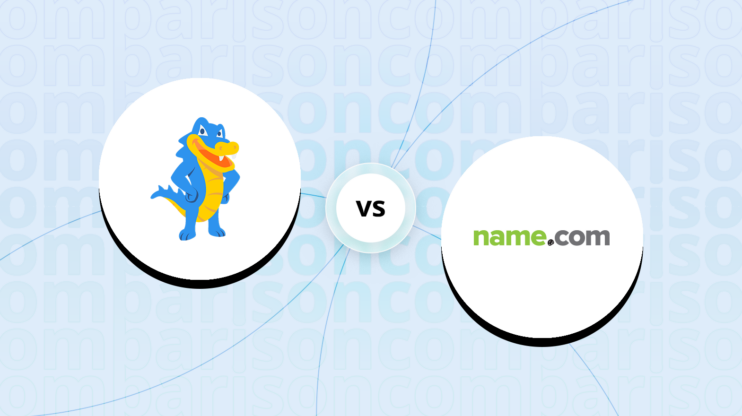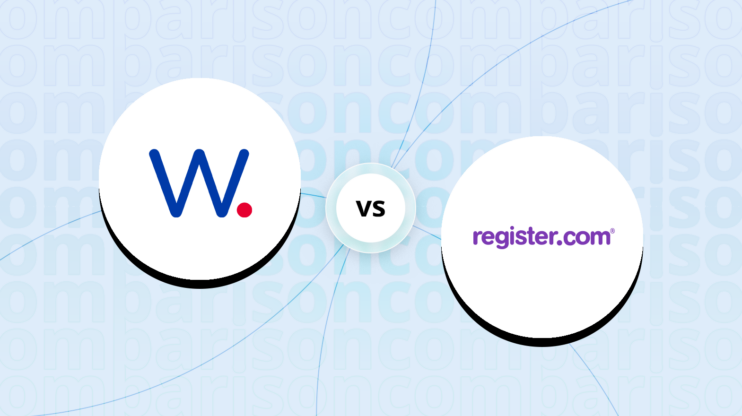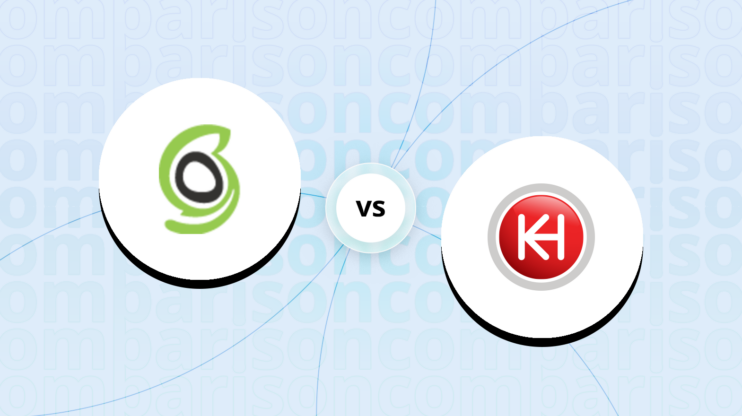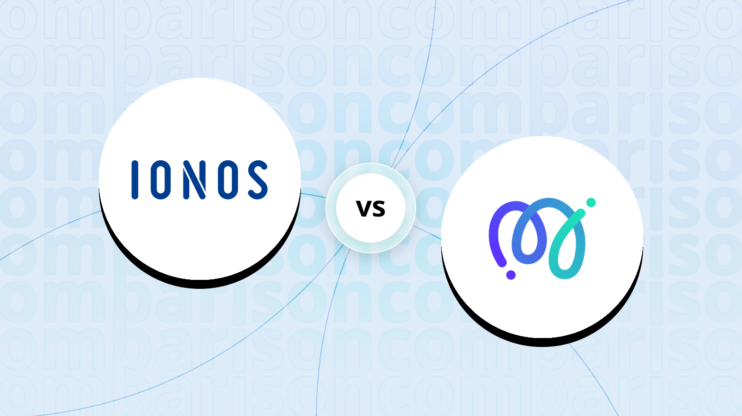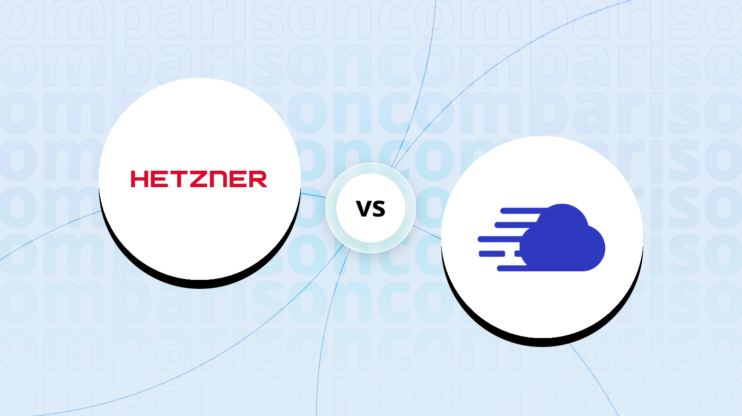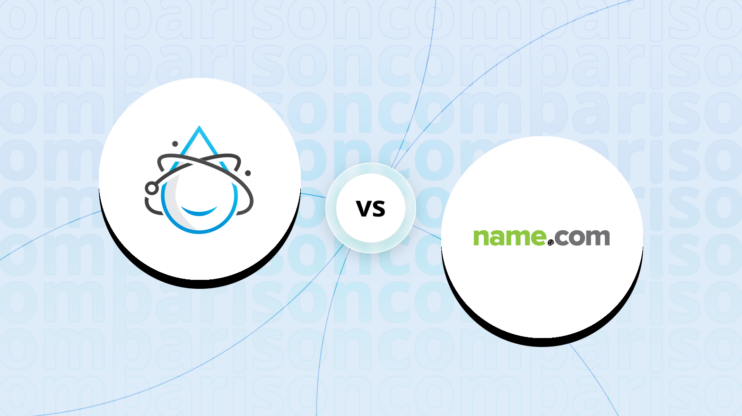Digital Ocean vs Web Hosting Pad: Final verdict
Both DigitalOcean and WebHostingPad offer distinct advantages and cater to varying user needs, making each suitable for specific scenarios.
DigitalOcean (Overall grade: 8.3)
delivers exceptional performance with its SSD storage, CDN integration, and advanced caching mechanisms for faster load times. It stands out with a high 99.99% uptime SLA, ensuring reliability for high-traffic and demanding websites. Advanced features include DDoS protection, firewalls, and automated backups, making it highly secure and reliable. DigitalOcean’s scalability options, such as load balancing and automatic horizontal scaling, make it ideal for growing agencies and businesses. However, it lacks built-in email hosting and a user-friendly website builder, which might not favor beginners.
WebHostingPad (Overall grade: 6.1)
focuses on simplicity and affordability, appealing to beginners and small businesses. It provides unlimited hosting space, bandwidth, and email accounts, along with a free one-year domain registration and a user-friendly Weebly site builder. The platform includes free SSL and basic security features like SiteLock Lite, making it cost-effective for those with smaller sites. However, it only offers a 99.9% uptime guarantee and lacks the advanced security measures and scalability features of DigitalOcean. For those seeking an affordable and straightforward solution with ample support, WebHostingPad is a competent choice, albeit with some limitations in features and performance.
 Overall grade:8.3 |
 Overall grade:6.1 |
|
|---|---|---|
| Uptime and Availability | 9.2 | 8.0 |
| Hosting Performance | 8.8 | 5.0 |
| Hosting Security | 9.1 | 8.0 |
| Price | 8.7 | 8.0 |
| Hosting Features | 6.9 | 5.2 |
| Ease Of Setup | 8.2 | 7.2 |
| User Management | 8.0 | 0.0 |
| Customer Support | 7.8 | 7.2 |
| User feedback | 4.6/5 | 4.7/5 |
Hosting types offered
Both platforms provide a variety of hosting types, each designed to meet the different needs of users.
 |
 |
|
|---|---|---|
| Shared hosting | ||
| Cloud hosting | ||
| WordPress hosting | ||
| Ecommerce hosting | ||
| VPS hosting | ||
| Dedicated hosting |
Although both offer a variety of hosting plans tailored to different needs, in
certain cases, one platform may prove to be more suitable.
Detailed comparison
Uptime and availability
Evaluates the average uptime statistics, uptime guarantee and overall availability of the hosting
provider
Score Components:
- Uptime percentage (30%): evaluates the uptime statistics in given period of time
- Uptime guarantee (20%): Assesses if the platform offers an uptime guarantee and
whether the actual uptime matches the promised guarantee. - General performance (25%): Evaluates how fast is the average response time and overall
it’s stability. - Responsiveness (10%): Adaptability to different devices and screen sizes.
- Availability (25%): Reflects the total downtime and number of outages.
 9.2
9.2
 8.0
8.0
🏆 Winner DigitalOcean: Offering superior uptime and availability guarantees.
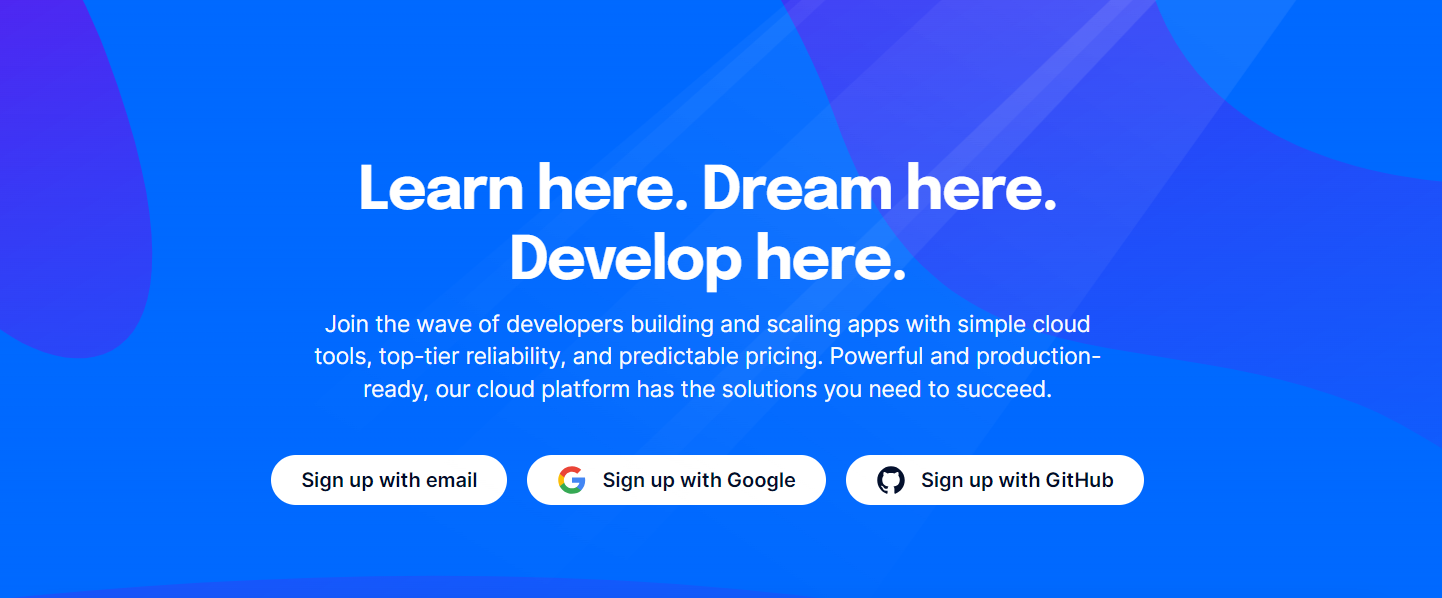
DigitalOcean boasts several advanced features in uptime monitoring and availability. With a 99.99% uptime SLA, it ensures that services are rarely offline. Real-time alerts and latency graphs empower users with immediate, actionable information to maintain high performance. The global monitoring system and customizable alerts add another layer of assurance for users, ensuring their assets are continually monitored and issues are swiftly addressed.

WebHostingPad, while offering a modest 99.9% uptime guarantee, lacks the same level of sophistication in monitoring and alerting as DigitalOcean. The exclusions in their uptime guarantee could be limiting, although they do provide compensation for downtime exceeding their SLA. Both platforms are reliable, but DigitalOcean stands out with higher availability levels and more advanced monitoring features.
Which one has better hosting performance?
Score Components:
- Hosting speed (30%): This includes SSD quality, Load times, PageSpeed score ranges,
additional information on website speed, built-in plugins for performance enhancement, available caching
methods, and CPU/RAM options - CDN (20%): Considers whether CDN is available or not, whether it’s free or paid, and
the quality of the CDN service - Available data centers (30%): Evaluates the number of data centers and their locations
globally. - Scalibility (20%): Looks at whether elastic scaling is available, the process required
to scale (manual upgrade vs. automatic scaling), the presence of dedicated servers, and the costs
associated with scaling.
 8.8
8.8
 5.0
5.0
🏆 Winner: DigitalOcean: A scalable and developer-friendly cloud hosting provider.
Both DigitalOcean and WebHostingPad offer distinct hosting services catering to different user needs. DigitalOcean offers exceptional performance with its SSD storage, various caching mechanisms, and a CDN for faster load times. With 14 globally distributed data centers, it ensures low latency and better reliability. WebHostingPad, meanwhile, provides solid features like free SSL, SiteLock Lite, and analytics tools, but only guarantees a 99.9% uptime compared to DigitalOcean’s 99.99%. The speed and reliability edge clearly go to DigitalOcean, aided by its built-in performance features and data center distribution.
Website Speed
DigitalOcean excels in website speed with SSD storage, CDN integration, and advanced caching mechanisms to reduce server load and improve response times. The Droplets can handle multiple Linux applications with ease, guaranteeing quick retrieval of data and smooth website operation. WebHostingPad offers optimized high-power servers for WordPress plans, but lacks the comprehensive performance boosting features of DigitalOcean, making it a slower option in most cases.
Scalability
DigitalOcean’s flexibility shines with features like load balancing and automatic horizontal scaling, allowing users to handle traffic spikes without manual intervention. The platform supports a seamless transition from basic to more complex setups without significant cost increases, starting at $4 per month. WebHostingPad offers scalable plans designed for growth, but lacks the automatic scalability features of DigitalOcean. Exact costs for scaling on WebHostingPad are unclear, suggesting it might involve more manual effort or plan upgrades.
Which one has better security features?
and regulatory requirements
Score Components:
- Technical security measures (40%): This includes encryption, firewalls, DDoS
protection, secure configurations, server monitoring, access control and availability of security addons
(e.g Sitelock security). - Operational security measures (30%): Encompasses data privacy, backups and data
redundancy. - Compliance and certifications (20%): Adherence to legal and regulatory requirements
(e.g., GDPR, HIPAA) and possession of certifications (e.g., ISO 27001, SOC 2). - Business and reliability (10%): Factors in the provider’s reputation, uptime
guarantees, and customer support.
 9.1
9.1
 8.0
8.0
🏆 Winner DigitalOcean: An extensive suite of security features and stringent compliance standards.
Technical security measures
DigitalOcean offers a broad range of technical security features, including DDoS protection, cloud firewalls, and SSH access. It supports various PHP versions, enabling flexibility for application needs. WebHostingPad provides free SSL certificates and commercial SSL certificates, PHP support, and malware scans, but details about PHP versions are not specified. DigitalOcean includes additional layers such as two-factor authentication, automatic backups, and data encryption, which offer a more robust security infrastructure compared to WebHostingPad’s offerings.
Operational security measures
DigitalOcean employs firewalls, VPCs for secure networking, and managed databases with TLS/SSL. WebHostingPad secures and maintains server software like Apache and MySQL and includes basic user support for email and FTP clients. DigitalOcean offers automatic backups and data encryption both at rest and in transit. WebHostingPad provides automatic backups and has a spam filtering system. In operational scope, DigitalOcean’s comprehensive measures, like load balancers and object storage with identity verification, provide enhanced protection and reliability.
Compliance and certifications
DigitalOcean complies with GDPR, PCI-DSS, and holds various certifications including SOC 2 Type II, SOC 3 Type II, ISO/IEC 27001:2013, and CSA STAR Level 1. WebHostingPad is GDPR-compliant and emphasizes securing personal data. However, specifics on its PCI compliance and additional certifications are not provided. DigitalOcean’s extensive list of certifications ensures adherence to multiple international security standards.
 |
 |
|
|---|---|---|
SSL certificate |
Yes |
Yes |
Additional security features |
DDoS protection, firewalls, SSH access, 2FA |
Malware scans, spam filtering, SiteLock Lite |
PHP versions |
Various supported |
Supported, specific versions not specified |
GDPR compliance |
Yes |
Yes |
HIPAA compliance |
Not specified |
Not specified |
PCI compliance |
Yes |
Not specified |
Hosting features
Score Components:
- Domains (20%): Assesses the availability of a free domain, domain purchase options, and
pricing - Email (15%): Considers if the provider offers full email hosting, or is reselling
third-party service, and if the email is only transactional or not - Website builder (15%): Checks if website builder is available, and it’s user
friendliness and overall the level of customization allowed. - Staging environment (20%): Determines if a staging environment is available, allowing
for testing changes before going live. - FTP & SFTP accounts (10%): Evaluates if and how easily users can access FTP and
SFTP accounts - Git and SSH access (20%): Assess whether Git is integrated into the hosting service and
if SSH access is provided
 6.9
6.9
 5.2
5.2
🏆 Winner
DigitalOcean: A versatile hosting provider with a balanced mix of security, performance, and support.
DigitalOcean and WebHostingPad offer a range of features appealing to various user needs. DigitalOcean shines with its robust security measures, including DDoS protection, firewalls, and two-factor authentication. It offers a wide array of hosting types like VPS, Managed WordPress, and Kubernetes services, catering to those who need scalable options. DigitalOcean provides a web application firewall and high-speed networking, which enhances security and performance. Though it requires SSH for SFTP configuration, the access is straightforward for users familiar with command-line interfaces. The platform also includes free SSLs and a high uptime guarantee, making it trustworthy for businesses prioritizing performance and reliability.
WebHostingPad, contrasting DigitalOcean’s offerings, focuses on simplicity with unlimited hosting space, bandwidth, and database options. Its inclusion of a free one-year domain registration and a user-friendly Weebly site builder could be enticing for beginners or small businesses. It also offers free SSL and SiteLock Lite, which secures websites without extra cost. WebHostingPad doesn’t explicitly mention SSH access, and its FTP support seems less streamlined than DigitalOcean’s approach. For those in need of unlimited storage and email accounts, the offerings of WebHostingPad are beneficial. However, it lacks some of the advanced security features present in DigitalOcean’s package.
 |
 |
|
|---|---|---|
Free domain |
No |
Yes, for the first year |
Free SSL |
Yes |
Yes |
Email hosting |
No |
Yes |
Website builder |
No |
Yes (Weebly) |
Staging environment |
No |
No |
FTP & SFTP account |
Yes (SFTP can be configured) |
Yes |
Git and SSH access |
Yes |
No |
Free backup |
Yes |
No |
Money back guarantee |
No |
No |
a location.
As a result in rare cases the features mentioned here can differ from the ones you see on their websites.
Both providers support a range of users from beginners to experts with user-friendly website builders and WordPress staging areas. However, in terms of developer tools, both DigitalOcean and WebHostingPad offer robust options including SSH access, support for multiple programming languages, and Git for version control, thus appealing to developers looking for advanced capabilities.
Email services:
DigitalOcean does not offer built-in email hosting or advanced email campaign features. WebHostingPad provides unlimited email accounts, forwarding, webmail, and IMAP/POP3 support, enabling users to handle their email needs effectively. WebHostingPad’s offering suits smaller enterprises or individuals running multiple sites needing substantial email facilitation. It’s less clear if either provider resells third-party email services.
Price
Score Components:
- Plan value (40%): What each pricing tier offers.
- Transparency and clarity (30%): Clearness of pricing structures.
- Flexibility of plans (20%): Range of options to suit different budgets.
- Hidden costs (10%): Additional expenses not included in the plan.
 8.7
8.7
 8.0
8.0
🏆 Winner DigitalOcean: Offers a variety of hosting plans with extensive features at competitive prices.
Evaluating the pricing of plans among various hosting providers can be complex due to their differing pricing and renewal strategies. Additionally, certain plans require annual commitments, which adds to the difficulty of making comparisons. The prices listed are based on monthly commitments; plans requiring annual commitments are indicated. Additionally, although some providers offer identical plans for WordPress and shared hosting, we have created separate tables for each to enhance clarity.
Comparing DigitalOcean and WebHostingPad reveals distinct differences in their pricing and features. DigitalOcean’s WordPress hosting starts as low as $4/month and offers robust features including automatic backups and DDoS protection, while WebHostingPad’s plans begin at $2.99/month offering free SSL certificates and automated backups, though with fewer advanced security options. Shared hosting plans at DigitalOcean are priced from $4/month, emphasizing global data centers and 99.99% uptime, while WebHostingPad’s begin at $1.99/month with features like free domain names and unlimited websites. For VPS hosting, DigitalOcean’s plans start from $4/month for shared CPUs and go up to $131/month for specialized configurations, compared to WebHostingPad starting at $19.95/month offering dedicated IP addresses and managed options.
 |
 |
|---|---|
|
Basic Droplet$4
1-Click WordPress installation, free SSL certificate, automatic backups, DDoS protection, SSH access, global data centers. Value for price:9.0
|
WordPress Basic$2.99
2× Memory of Power Plan, free Let’s Encrypt SSL Certificate, automated & anytime backups. Value for price:7.5
|
|
Cloudways Managed Hosting($with $100 credits)
Managed WordPress hosting, free SSL certificate, built-in DDoS protection, unlimited scaling. Value for price:8.5
|
WordPress Pro$3.99
2× computing power, free trusted CA SSL certificate, fast servers. Value for price:8.0
|
| N/A |
WordPress Premium$5.99
3× computing power, free trusted CA SSL certificate, unlimited email accounts. Value for price:8.0
|
 |
 |
|---|---|
|
Website Hosting Basic Droplet$4
1-click apps, 99.99% uptime SLA, 14 data centers, transparent pricing. Value for price:8.7
|
Power Plan$1.99
Free domain name, free SSL & SiteLock Lite, unlimited websites, domains & email, free Weebly builder, automated backups. Value for price:7.0
|
| N/A |
Power Plan Plus$2.99
Free domain name, free trusted SSL & SiteLock Lite, optimized high-power servers, automated & anytime backups. Value for price:7.3
|
| N/A |
Power Plan Mini$3.00
Mobile-ready themes, unlimited email accounts, 10 GB disk space, 100 GB bandwidth, host up to 2 websites/domains. Value for price:6.5
|
 |
 |
|---|---|
|
Regular Shared CPU Droplets$4
Shared processing power, basic cloud services, global data centers. Value for price:8.0
|
N/A |
|
Premium Shared CPU Droplets$7
Enhanced memory performance, NVMe SSDs, better resource management. Value for price:8.5
|
N/A |
|
Dedicated CPU Droplets$42
4GB memory, 25GB SSD, 4TB transfer, dedicated resources. Value for price:8.6
|
N/A |
|
Memory-Optimized Droplets$84
16GB memory, 2vCPUs, 50GB SSD, 4TB transfer, specialized for memory-intensive applications. Value for price:8.8
|
N/A |
|
Storage-Optimized Droplets$131
16GB memory, 300GB SSD, 4TB transfer, ideal for storage-heavy requirements. Value for price:9.2
|
N/A |
| N/A |
VPS Hosting$19.95
Dedicated IP addresses, private hosting resources, full root access, managed options available. Value for price:7.0
|
Enterprise plans
For enterprises, DigitalOcean offers extensive VPS hosting plans ranging from shared to dedicated CPUs, including specialized configurations for memory and storage starting at $42/month. These plans include advanced features like automatic backups, global data centers, and robust DDoS protection. WebHostingPad caters to enterprise needs with its VPS hosting starting at $19.95/month, featuring dedicated IP addresses, 24/7 network monitoring, and full root access. While both provide competitive offerings, DigitalOcean’s more sophisticated configurations and extensive security features make it a preferred choice for large-scale business applications.
Digital Ocean vs Web Hosting Pad: Ease of setup
platform.
Score Components:
- Site migration (25%): Assesses whether the provider offers tools for site migration,
either automated or manual, and whether these services are free or require a fee. - Admin panel usability (35%): Evaluates the type of admin panel provided, such as the
standard cPanel or a custom solution, focusing on its accessibility and user-friendliness for both
technical and non-technical users. - Setup features (20%): Examines the availability and ease of use of various setup
features, including FTP accounts, file managers, email account setup, PHPMyAdmin, and easy CDN
configuration. - Help center quality (20%): Measures the quality and accessibility of the provider’s
help center resources, including articles and tutorials.
 8.2
8.2
 7.2
7.2
🏆 Winner DigitalOcean: An intuitive and powerful platform for deploying and managing websites.
DigitalOcean provides a flexible and user-friendly interface through its App Platform and Droplets. This is beneficial for both technical and non-technical users. The 1-Click Apps make it straightforward to set up popular applications like WordPress, without the need to manually configure the environment. For those who prefer a managed service, Cloudways (another service by DigitalOcean) offers a simplified management dashboard that handles all the technical backend, further easing the process for users who prioritize convenience and ease of use.

In contrast, WebHostingPad relies on standard solutions like cPanel and custom tools such as RVSiteBuilder. While offering multiple website builders like WordPress and Weebly, its setup process can be less streamline compared to DigitalOcean’s 1-Click Apps. cPanel is widely recognized for its comprehensive features, but might be challenging for novices who are not familiar with its interface. The learning curve for WebHostingPad’s administration tools can be steeper, making it less accessible to non-technical users compared to DigitalOcean’s straightforward options.
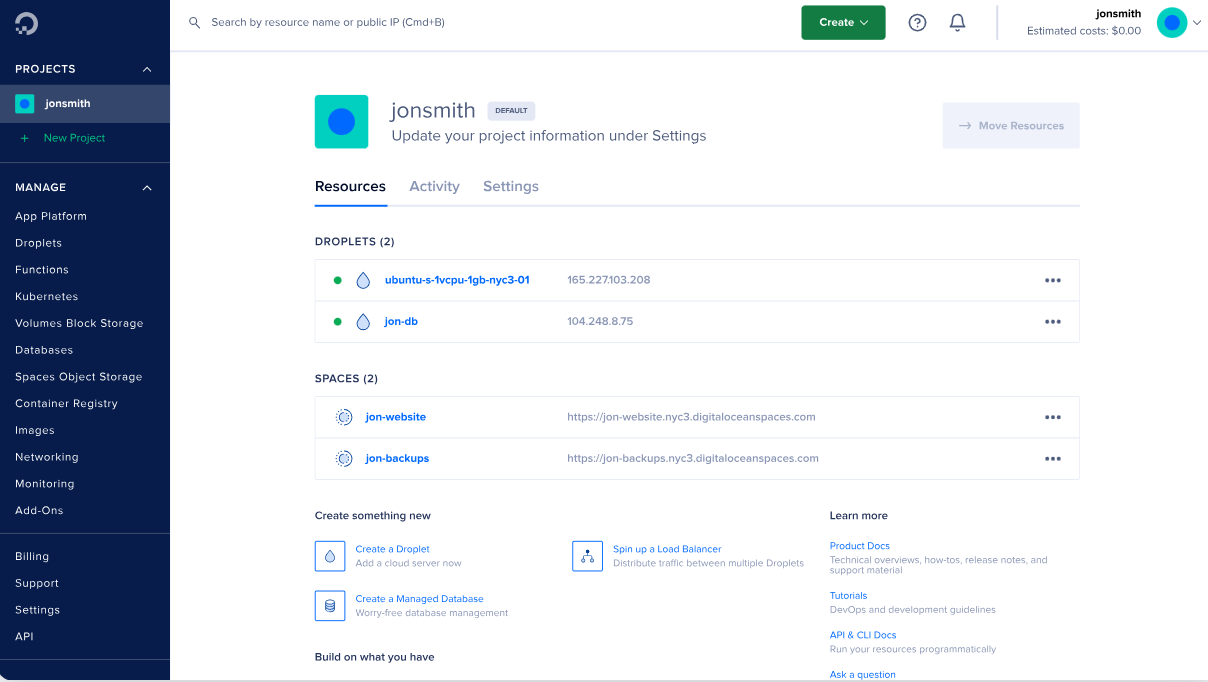
Both hosting providers offer site migration tools, but their approaches differ. DigitalOcean supports manual migration with ample documentational help and community support, but lacks specific automated migration tools. Cloudways, however, offers more straightforward migration for WordPress sites at no extra cost. On the other hand, WebHostingPad includes a variety of migration options mainly focused on WordPress, with minimal manual effort required and no additional fees for migration assistance, making it simpler for users switching to or from WordPress.
DigitalOcean and WebHostingPad both offer comprehensive support resources. DigitalOcean stands out with an extensive knowledge base, detailed tutorials, and a strong user community, which are particularly useful for troubleshooting and learning. The Cloudways affiliation enhances this with 24/7 support and additional community resources. WebHostingPad’s support options are also extensive, providing a structured knowledgebase, 24/7 technical support, and the ability to submit tickets or make phone calls for personalized assistance.
User management
accessibility.
Score Components:
- Role customization (40%): Flexibility in creating and defining user roles and
permissions. - Ease of management (30%): User interface and tools for managing users.
- Access control (20%): Effectiveness of access control measures for different user
levels. - Scalability (10%): Ability to manage a growing number of users efficiently.
 8.0
8.0
 0.0
0.0
🏆 Winner DigitalOcean: Offers comprehensive team membership and role management features.
When comparing the abilities of DigitalOcean and WebHostingPad in managing user roles, permissions, and overall accessibility, DigitalOcean stands out. DigitalOcean provides detailed definitions and flexibility in creating and managing user roles, including permissions such as Owner, Biller, and Member. Each role has specific access levels to shared resources and billing information, making it easy to restrict or grant access as required. Conversely, no specific information is available about WebHostingPad’s user management capabilities, making it difficult to assess its flexibility in this area.
DigitalOcean’s user interface for managing team members appears user-friendly and intuitive. It includes clear options for inviting new members through email, viewing membership status, and managing roles and permissions. The interface allows team owners to see details such as the sign-in method, enhancing transparency and security. Without comparative data on WebHostingPad’s tools for user management, it’s not possible to make a fair assessment, but the detailed features offered by DigitalOcean suggest a well-thought-out system.
DigitalOcean’s access control measures are effective, particularly suited to managing a growing number of users in a seamless manner. With no cap on the number of members or roles, team owners have substantial flexibility to scale their teams according to their needs. The platform’s ability to handle invitations, revoke access, and track sign-in methods contributes to its robust user management system. Without similar information on WebHostingPad, DigitalOcean emerges as a more reliable choice for efficient access control and team growth management.
DigitalOcean User Roles Table:
| Role | Description | Access highlights |
|---|---|---|
| Owner | Full control over shared resources and team settings. | Access to billing information, team settings, and all shared resources. |
| Biller | Manages all billing-related information. | Access limited to billing information only. |
| Member | Access to all shared resources without billing details. | Full access to shared resources but no access to billing or team settings. |
Customer support
hosting provider.
Score Components:
- Support communication channels (30%): Measures the variety of customer support types
provided (live chat, chatbot, email, phone, etc.) - Availability (20%): Assesses the availability hours for each channel, including 24/7
support options. - Technical support quality (30%): Assesses whether the provider offers comprehensive
technical support, including hardware upgrades (e.g., HDD to SSD), software installations, and web
server configuration changes. - Enterprise support (20%): Checks if there are dedicated or priority support services
for enterprise-level customers.
 7.8
7.8
 7.2
7.2
🏆 Winner DigitalOcean: A versatile hosting provider with a variety of support options and strong user-friendly features.
 |
 |
|
|---|---|---|
Phone support |
||
Live chat support |
||
Chatbot |
||
Email/ticket support |
||
Enterprise support (dedicated agent, priority support) |
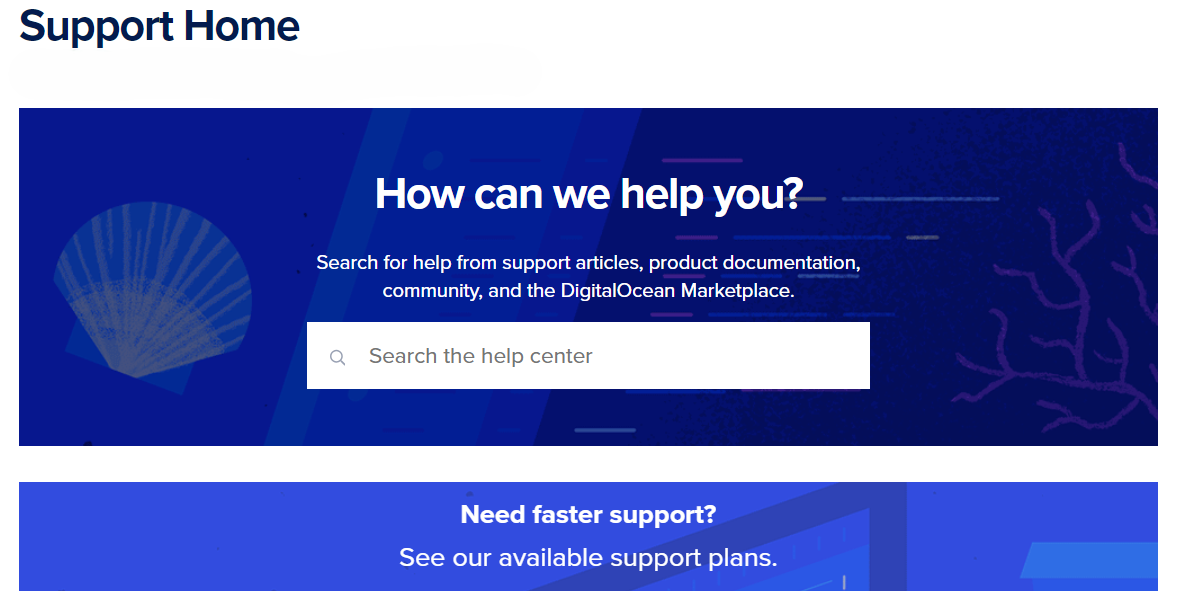
DigitalOcean offers extensive customer support through email and a 24/7 ticketing system, with the option for premium live chat and enterprise support. They also provide a community platform and comprehensive documentation to assist users with their needs. Their user-friendly control panel and intuitive registration process add to the overall positive experience. However, they have received some complaints regarding difficulties in contacting support for refunds or cancellations.

WebHostingPad provides customer support through phone, live chat, and a ticketing system, along with a knowledge base and 24/7 tech support. They offer phone support outside of regular working hours, although it is not available for all plans. A 30-day money-back guarantee and a free domain name for new accounts are notable benefits. While WebHostingPad offers comprehensive support, its availability and scope are marginally less extensive compared to DigitalOcean’s offerings.
Digital Ocean vs Web Hosting Pad: User feedback
User reviews for this hosting provider highlight its ease of use, affordability, and robust customer support. Users appreciate the simple and intuitive user interface, which simplifies the setup and management of virtual servers (droplets) and other cloud infrastructure. Many commend the company for its transparent pricing model and lack of hidden costs. However, some users mention limitations in higher-scale configurations and occasional slow customer support response times. Overall, it is highly recommended for small to medium-sized businesses and developers due to its reliable performance and reasonable pricing.
WebHostingPad receives high praise for its affordability, user-friendly interface, and comprehensive customer support. Users particularly appreciate the low costs, free domain, and SSL certificate offerings, making it a budget-friendly option with reliable uptime. However, some areas for improvement include occasional downtime, inconsistent billing practices, and a somewhat limited feature set for larger businesses. Overall, it is highly recommended for those starting out or looking for a cost-effective hosting solution with responsive support.
Digital Ocean vs Web Hosting Pad: FAQ
Which platform is better suited for hosting WordPress websites?
WebHostingPad is better suited for hosting WordPress websites, offering optimized hosting plans with enhanced features specifically for WordPress. DigitalOcean also supports WordPress hosting but requires more technical expertise, making WebHostingPad the more accessible choice for WordPress users.
Which platform offers better customer support?
DigitalOcean offers extensive support through email and a 24/7 ticketing system, with options for premium live chat and enterprise support. WebHostingPad provides phone, live chat, and ticket support alongside a comprehensive knowledge base, making it highly responsive. However, DigitalOcean’s premium support offerings provide a slight edge in customer service.
Which hosting service offers more scalability options for growing websites?
DigitalOcean provides more scalability options with features like load balancing and automatic horizontal scaling, ideal for handling traffic spikes and growth. WebHostingPad also offers scalable plans but lacks the advanced and automatic scalability features of DigitalOcean, making DigitalOcean the better choice for rapidly growing websites.
Which service is more suitable for hosting a high-traffic website?
DigitalOcean is more suitable for hosting high-traffic websites due to its exceptional performance with SSD storage, CDN integration, and a high 99.99% uptime SLA for reliability. WebHostingPad, while cost-effective, only offers a 99.9% uptime guarantee and lacks the advanced performance features necessary for high-traffic sites.
What are the major differences in pricing and value between DigitalOcean and WebHostingPad?
DigitalOcean’s WordPress hosting and basic droplet plans start at $4/month, offering robust features like automatic backups and DDoS protection. WebHostingPad’s hosting plans begin at lower prices, such as $1.99/month for shared hosting, focusing on cost-effectiveness with features like free SSL and unlimited email accounts. DigitalOcean delivers higher value with advanced security and performance features, while WebHostingPad appeals with affordability and simplicity.
The making of this blog
We followed a clear, step-by-step process to write and research this article.









